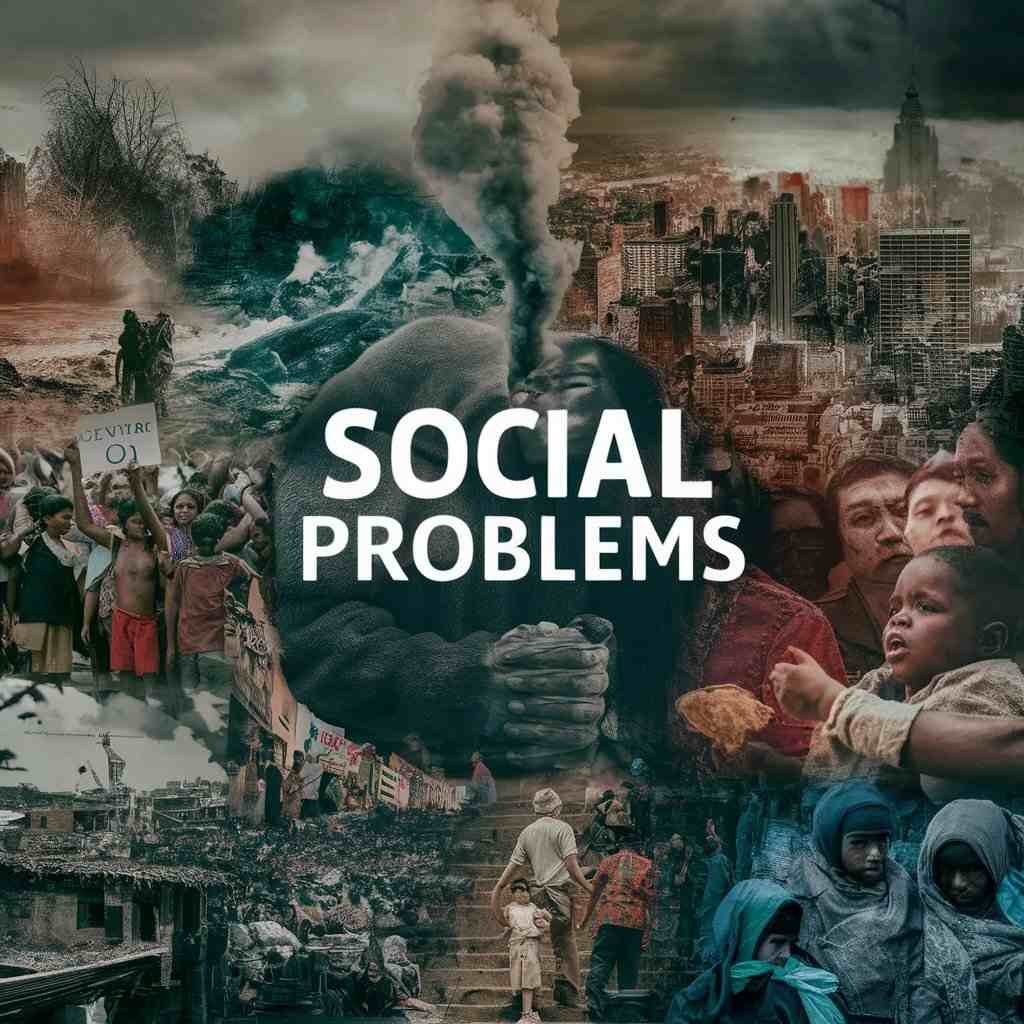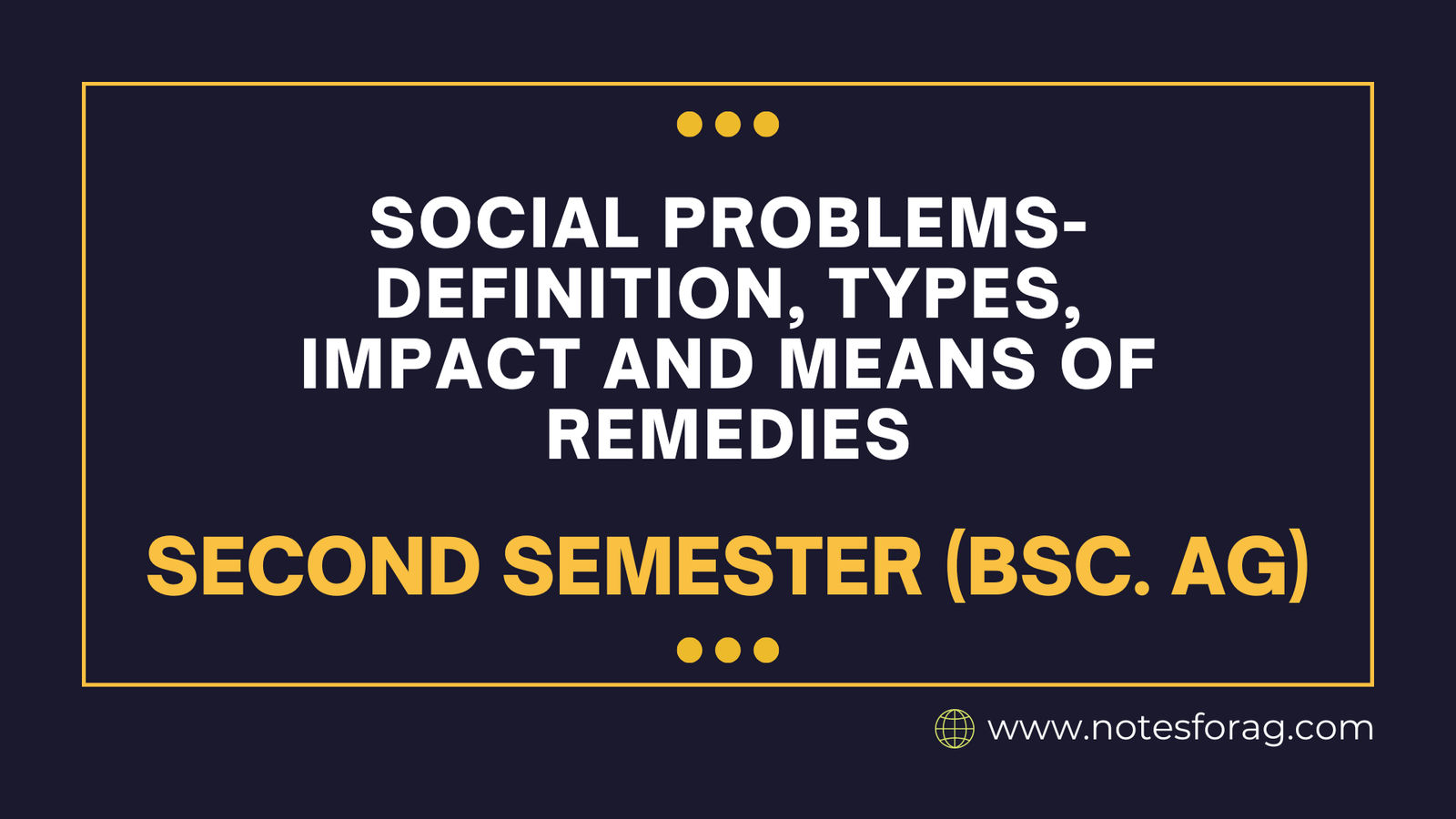Social problems, including discrimination, poverty, and inequality, are complicated issues that have an impact on the stability and well-being of communities all over the world. Since systemic failures are frequently the source of these issues, comprehensive solutions are needed to address their underlying causes. We can endeavor to create a more just and equitable society by comprehending the underlying causes and putting specific solutions—like education, economic opportunities, and policy reforms—into practice. Governments, businesses, and individuals must work together to create significant change and raise everyone’s standard of living.
Table of Contents
Introduction to Social Problems

Social problems are intricate matters that impact the welfare of both individuals and groups in a given community. They are characterized as circumstances or actions that negatively impact a significant number of individuals and are widely acknowledged as requiring attention. Recognizing when a situation deviates from society norms and values and realizing the widespread effects it has on the community are typically necessary steps in identifying social problems.
Common social issues like poverty, crime, and inequality show how varied these problems are. Economic, racial, or gender-based inequality can cause social unrest and impede the advancement of society. Crime is another ubiquitous social issue that has an impact on general well-being and community safety. Possibly one of the most serious social issues, poverty affects not only those who are directly affected but also has wider societal repercussions, such as higher healthcare expenses and lower economic productivity.
Common Types of Social Problems
Social problems encompass a broad spectrum of issues that impact communities and societies worldwide. These problems can be categorized into economic, social, and environmental issues, each with its own set of challenges and root causes.
1. Economic Issues
Economic concerns like unemployment, poverty, and income inequality are widespread social problems. Millions of people throughout the world struggle with poverty, which restricts their access to necessities like food, shelter, and medical care. Another major economic problem is unemployment, which can result in unstable finances and higher crime rates. The gap between the rich and the poor gets wider as a result of income inequality, which exacerbates these issues even more. Systemic inequality, unequal access to high-quality education, and differences in the labor market are frequently the underlying causes of economic problems.
2. Social Issues
The well-being of society is negatively impacted by social issues such as substance abuse, criminality, and discrimination. Individuals who are subjected to discrimination on the basis of their race, gender, or sexual orientation may experience social exclusion and have fewer opportunities. Safety and stability in communities are threatened by crime, including violent and theft crimes. Substance abuse, which includes the improper use of drugs and alcohol, poses serious health and social problems. These problems are frequently caused by mental health disorders and socioeconomic stress. Addressing underlying issues like social inequality and a lack of support networks is necessary to solve social problems.
3. Environmental Issues
Environmental issues, such as deforestation, pollution, and climate change, seriously threaten human societies as well as natural ecosystems. Air, water, and soil are contaminated by pollution resulting from industrial activities and waste, which poses a health risk and reduces biodiversity. Rising sea levels and extreme weather are two effects of climate change brought on by greenhouse gas emissions that affect communities all over the world. Large-scale forest clearing, or deforestation, upsets ecosystems and fuels climate change. Lack of regulatory frameworks, insufficient awareness, and unsustainable practices are frequently the root causes of environmental problems.
Understanding these categories of social problems is crucial for developing effective remedies. Addressing root causes, such as systemic inequality, lack of education, and environmental degradation, requires coordinated efforts from governments, organizations, and individuals alike.
Impact of Social Problems on Society
Social problems have a wide-ranging and significant effect on society, influencing areas like public health, economic growth, and general quality of life. Social breakdown brought on by these problems frequently creates an atmosphere that severely impedes advancement. The decline in worker productivity is one of the main economic effects of social problems. A significant portion of the population’s potential is restricted by problems like poverty and illiteracy, for example, which results in a workforce that is less skilled and slows economic growth. Countries with high levels of social unrest and inequality typically have slower rates of economic development because these factors create an unstable business environment that discourages investment, according to a World Bank report.
Another important area that is impacted by social issues is public health. Substance abuse and mental health problems, for instance, can put a pressure on medical facilities and increase healthcare costs. According to the Centers for Disease Control and Prevention (CDC), chronic illness and mental health disorders are more common in areas with high levels of social problems, such as unemployment and crime. These health problems not only lower people’s quality of life but also put a heavy financial strain on the healthcare system.
In addition, social issues are a factor in the general reduction in life quality. Communities can become less cohesive as a result of problems like discrimination, domestic abuse, and criminality, which foster an atmosphere of mistrust and terror. Based on case studies, neighborhoods with high crime rates typically have lower property values and lower levels of community involvement, which perpetuates a downward spiral that is hard to escape. For example, an Urban Institute study discovered that neighborhoods with high crime rates experienced a 10% to 15% decline in property values, thereby exacerbating already existing economic disparities.
Remedies and Solutions for Social Problems
A multifaceted strategy that combines policy changes, community-based projects, and educational initiatives is needed to address and resolve social problems. Governments are essential to the implementation of legislative changes that can lessen social problems. The well-being of society can be greatly impacted by changes in policy that are intended to lower income inequality, increase access to healthcare, and strengthen social safety nets.
Initiatives rooted in the community are another essential element in solving social issues. These programs frequently entail residents and neighborhood organizations collaborating to pinpoint and resolve particular problems in their communities. Effective instances include community health clinics offering vital services, local food banks battling hunger, and neighborhood watch programs lowering crime. In addition to meeting immediate needs, these neighborhood initiatives promote a sense of belonging and shared accountability.
Additionally, educational initiatives are essential to resolving social issues. Education enables people to take action by increasing awareness and giving them the information and abilities needed to address problems like discrimination, drug abuse, and environmental degradation. Programs that teach youth the risks associated with drug use or the value of recycling, for example, can result in long-term positive behavioral changes.
Globally, there are countless instances of effective social problem-solving. The adoption of comprehensive social welfare policies has resulted in a notable decrease in poverty and inequality in Finland. Millions of Indians have been enlisted in the Swachh Bharat Abhiyan (Clean India Mission) to promote public health and sanitation. These illustrations show that significant progress in resolving social issues can be achieved with the appropriate tactics and group effort.
The significance of group action must be emphasized once more. Rebuilding long-lasting change requires the participation of non-governmental organizations (NGOs), governments, and individuals. NGO participation can help close gaps and provide resources where they are most needed, even though community initiatives and policy reforms are important. The greater endeavor of resolving social issues is also aided by individual acts, such as advocacy, volunteering, or just making better decisions.
Frequently Asked Question(FAQ)
What are social problems?
Social problems are concerns that have an adverse effect on people as individuals, as groups, and as societies. They frequently touch on issues like discrimination, poverty, inequality, unemployment, and poor access to healthcare and education.
What are some current social problems facing the world today?
Income inequality, racial and gender discrimination, access to healthcare and education, refugee crises, and mental health concerns are some of the contemporary social issues.
Related Articles

